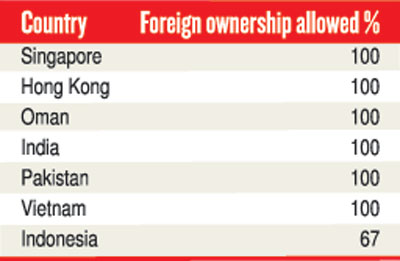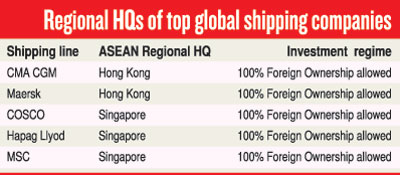Columns
Maritime hub: Case for the liberalisation of shipping and freight forwarding
View(s):One of the key objectives of the Government’s Vision 2025 is to develop Sri Lanka as a maritime and trading hub for the Indian Ocean, fully leveraging its conducive geographic location. Accordingly, significant investments have been made in the country’s physical infrastructure, particularly in the Hambantota Port and the Colombo Port, with further development of the Trincomalee Port on the horizon.
Nonetheless, Sri Lanka’s shipping industry remains primarily a trans-shipment driven industry. For the industry to evolve beyond this it is necessary to see the development of broader services in shipping and logistics. It is then that Sri Lanka could truly become a maritime hub.
Sri Lanka is not a mega ship owner, and lacks the global scale or capital to develop that level of shipping activity. In this context, to become a hub we must position ourselves to encourage the major global industry players to set up in Sri Lanka and provide maritime services to Sri Lankan traders and to the region beyond.
However, at present there is a restriction by law that makes it unattractive for global shipping lines to establish a major presence in Sri Lanka. By law, a foreign entity cannot own more than 40 percent of a shipping company in Sri Lanka. Naturally, for a company intending to establish a major presence in an economy, they would expect to at least have control over their operation and not a minority stake.
This restrictive structure is not the case for the majority of Sri Lanka’s foreign investment regime. Even strategic sectors such as banking and telecommunications can have majority foreign ownership. This has enabled Sri Lankans to access world class telecommunications services and international banking services.
In shipping as well, Sri Lanka should move towards a more liberal regime to attract the top global players to invest in Sri Lanka. In fact our supposedly less liberal neighbours, India, and Pakistan have fully liberalised their shipping industries.
Whilst Sri Lanka’s shipping industry is no doubt a force to reckon with, the choice of having an agency or not should be the wish of the owner of the business who brings in vessels to port in Sri Lanka and regional cargo to Colombo. In fact if the service provided by Sri Lanka’s industry adds significant value, there is no reason for the owning company to change its model.
But it should be their choice. The owners and operators should have the freedom to decide on their operating models. That freedom would make Sri Lanka a competitive and an attractive choice to invest and relocate regional headquarters which will, over a period of time, help transform the location advantage to a real meaningful logistics hub.
Furthermore, with liberalisation come better options for local exporters and importers, as they can have direct dealings without third parties, which will reduce costs such as commissions. To drive our export growth we must create the most competitive structure for export supporting services such as shipping and logistics.
Sri Lanka’s ambitions of becoming the maritime hub for the Indian Ocean would receive a major boost if we can attract a major global shipping company such as Maersk to make an anchor investment in Sri Lanka. Other leading shippers and freight forwarders are likely to then follow suit, creating a critical mass for a hub.
Going a step further, we can look at positioning Sri Lanka to attract companies like Amazon for warehousing for e-Commerce in the region. Support services such as financial services, legal services and other professional services can thrive in this environment. To do all this we need the right investment climate.
We need to seriously consider the approach of allowing up to 100 percent foreign ownership in cases where the shipping company would make a significant investment over a period of time. Our investment policy should not be one of attracting fly by night operators — and our investment thresholds and conditions can be structured to achieve that. In other cases without major investment, a gradual approach to liberalisation will be considered.
One thing is for sure, and that is we need to move beyond our current restrictive investment structure in shipping to have any chance of becoming a true maritime hub for the Indian Ocean.




Leave a Reply
Post Comment